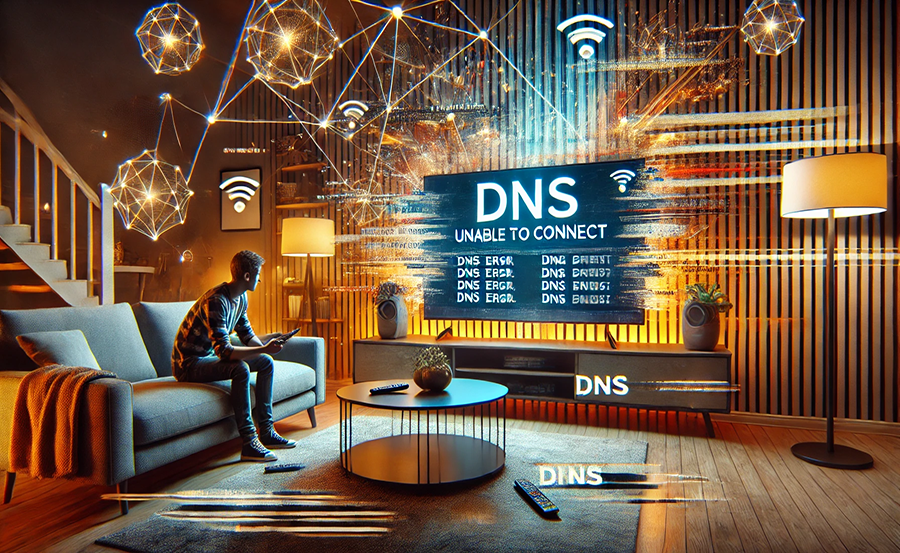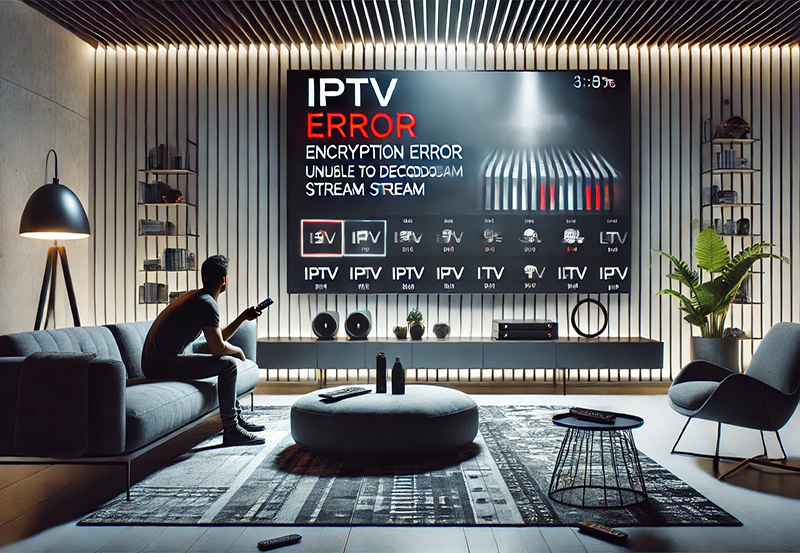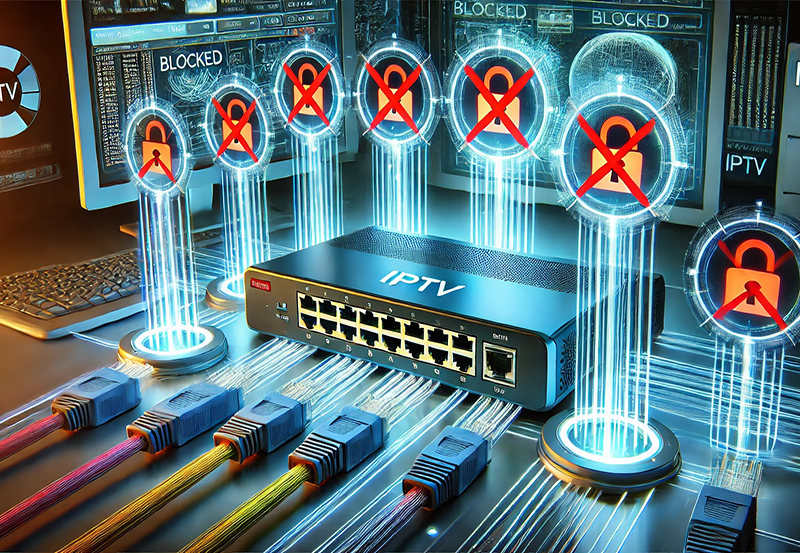As technology continues to evolve, so does the way we consume entertainment. IPTV (Internet Protocol Television) is at the forefront of this revolution, offering a flexible and immersive viewing experience that’s changing how we watch TV. Yet, with innovation comes challenge—particularly when it comes to maintaining seamless streaming.
Did you ever find yourself right in the middle of a gripping scene when the dreaded buffering wheel appeared? Frustrating, right? This comprehensive guide is here to ensure that those moments are few and far between. By tweaking your DNS settings, you can optimize IPTV on Smart TV, enhancing both performance and enjoyment. Let’s explore how next-level IPTV can be accessible with just a few adjustments.
Understanding DNS and Its Role in IPTV Streaming
The Domain Name System (DNS) is often likened to the phone book of the internet. It translates user-friendly domain names into IP addresses, guiding your request through cyberspace to deliver the content you desire. For IPTV users, efficient DNS settings are crucial. They not only speed up connections but can also bypass regional restrictions and improve privacy.
Pro Tip:
Get high-quality streams with Affordable IPTV services for a world-class viewing experience.
With the right adjustments, you can take IPTV to the next level of fun, enjoying a streaming experience that’s smoother than ever before. Understanding the inner workings of DNS and its impact on IPTV compatibility with devices can be empowering. Let’s dismantle the complexities.
How DNS Settings Affect IPTV Streaming
At the heart of every streaming conundrum lies DNS settings. Poor configuration can lead to delays, ultimately impacting the quality of your IPTV service. By optimizing these settings, you ensure your device finds the shortest and most efficient route to your IPTV provider’s server.
While a device might come with default DNS settings given by your ISP (Internet Service Provider), exploring options like Google DNS or OpenDNS might unveil significant improvements. Many users report faster, more reliable streaming, with the added bonus of enhanced security features.
Exploring Alternative DNS Options
- Google DNS: Being one of the fastest and most reliable, Google’s DNS servers (8.8.8.8 and 8.8.4.4) are favored for speed.
- OpenDNS: Known for added security features, using OpenDNS (208.67.222.222 and 208.67.220.220) can protect against phishing and unwanted content.
- Cloudflare DNS: With a focus on privacy and improved browsing speed, Cloudflare (1.1.1.1) is an excellent alternative.
When selecting the best DNS setting for your IPTV on Smart TV, consider what additional benefits—like security or parental control—you might want.
Practical Steps to Change DNS Settings
Changing your DNS settings might sound daunting, but it is a straightforward process if followed step-by-step. Whether you’re tech-savvy or a beginner, this guide will assist you in configuring your device for an optimized IPTV experience.
For Smart TVs
Smart TVs offer a seamless way to access IPTV services. To enhance their performance by changing DNS settings, follow these steps:
- Access the “Settings” menu from your Smart TV remote.
- Navigate to “Network” and then “Network Status.”
- Select “IP Settings” followed by “DNS Settings.”
- Choose “Enter Manually” and input your preferred DNS values.
- Restart your television to apply the changes.
Voila, your Smart TV should now deliver a more seamless IPTV experience!
For Streaming Devices
Devices like Roku, Amazon Fire Stick, and Nvidia Shield also support DNS changes. Generally, the approach mirrors that for Smart TVs, with minor differences specific to each operating system.
The process typically involves the following:
- Accessing network settings.
- Navigating to advanced or IP setup options.
- Manually entering DNS addresses as outlined.
Remember, each device is unique, so it’s always wise to refer to user guides or manufacturer support for precise instructions.
Tools and Tests: Ensuring Optimal Performance
Once your DNS settings are modified, confirming the benefits is crucial. Utilizing specific tools can help verify the speed and performance of your IPTV service.
Speed Test Tools
Conducting a speed test can confirm improvements or highlight persistent issues. Here are some recommended tools:
- Speedtest by Ookla: A comprehensive tool for measuring internet speed.
- Fast.com by Netflix: Offers a quick and simple speed test, especially relevant for streaming.
By comparing results before and after DNS adjustments, you can quantitatively assess the impact on your streaming quality.
Testing Device Compatibility
IPTV compatibility with devices plays a significant role in seamless streaming. Ensuring the device can handle bandwidth and support the codecs required by your service might involve:
- Checking the technical specifications of your streaming device.
- Ensuring firmware or software is up to date.
- Testing different apps or players for enhanced compatibility.
These steps help pinpoint and resolve device-specific issues that may impede IPTV performance.
Enhancing IPTV Enjoyment: Best Practices
Adopting a few best practices can significantly enhance IPTV enjoyment, taking your entertainment experience to new heights—here are some practical tips.
Optimizing Wired vs Wireless Connections
While wireless connections offer convenience, wired connections often ensure more robust network performance, ideal for high-resolution IPTV. Whenever possible, connecting your streaming device directly via Ethernet can reduce latency and signal interference.
If a wired connection is impractical, positioning your router suitably or using Wi-Fi extenders can enhance coverage and stability.
Regular Maintenance and Updates
Software and hardware updates can bring improvements and necessary fixes. Ensure your devices and applications are always running the latest versions.
Additionally, periodically restarting your devices can resolve small glitches that might accumulate over time, affecting streaming quality.
A Final Thought: The Future of IPTV and DNS
With technology advancing at breakneck speed, the future of IPTV seems bright and limitless. As services continue to grow, so too will the methods to optimize them, including DNS innovations. Embracing these changes is integral to staying ahead in a rapidly digitalizing world.
As you refine your IPTV setup, these slight modifications in DNS can significantly impact how you access content, eventually revolutionizing how you consume entertainment daily.
FAQs: Navigating Common IPTV and DNS Queries

What is IPTV, and how does it differ from traditional TV?
IPTV delivers television content over the internet, allowing playback on different devices, unlike traditional TV broadcasts, which rely on cable or satellite connections. IPTV offers greater flexibility and interactive features suitable for modern viewing habits.
Will changing DNS settings affect other internet activities?
Generally, adjusting your DNS settings should primarily impact browsing speed and performance positively. It’s unlikely to disrupt other internet activities; instead, you might notice faster responses and enhanced privacy as a bonus.
Is a paid DNS service better for streaming IPTV?
While free DNS services like Google DNS and Cloudflare work well for most, premium services can offer additional features such as custom filtering or dedicated connections, which might be beneficial if you seek extra security or performance guarantees.
Can changing DNS settings improve IPTV quality on all devices?
Changing DNS settings can generally improve streaming quality, but its effectiveness depends on the type and configuration of your device, your current ISP, and the particular DNS service selected. Testing is always advised to measure tangible gains.
Is it legal to use IPTV services?
Legally using IPTV services depends on the provider and content access agreements. Many legitimate services exist, but it’s crucial to ensure compliance with regional laws to avoid legal pitfalls.
Analyzing and Fixing M3U Link Errors: A Guide for IPTV Users





